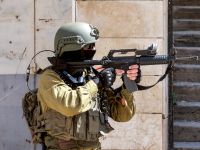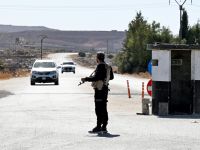American and Israeli intelligence officials have reached the conclusion that Palestinian leader Yasser Arafat has forged a new alliance with the Islamic Republic of Iran, which involves Iranian shipments of heavy weapons and millions of dollars to Palestinian groups that are fighting a guerilla war against Israel, according to a report in an American prestigious daily.
The alliance, according to officials, was arranged in the course of a secret meeting in Moscow last May between two senior aides to Arafat and Iranian government officials. The meeting occurred while Arafat was visiting Russian President Putin, according to senior Israeli security officials.
Israeli officials say that Arafat’s partnership with Iran gives the Palestinians a well-armed patron in the growing violent conflict with Israel. American officials said they were also concerned by intelligence reports that say Iran is harboring Al Qaeda members, including one leader who recently tried to mount an attack against Israel from his safe haven in Iran.
Iran's ties with the Palestinians came allegedly into the public eye in January this year when Israel seized the Karine A ship, carrying 50 tons of Iranian-supplied arms. The Karine A was a direct outgrowth of the secret meeting in Russia last May between Arafat's aides and Iranian intelligence officers, senior Israeli security officials said.
Both the Palestinians and Iranians deny having a working relationship, however American and Israeli officials say they now see the shipment as part of a broader relationship. They claim that those ties began with several smaller attempts by Iranian-backed groups in Lebanon to supply arms and were cemented during the Moscow meeting. Israeli and American officials believe that Arafat personally approved the dealings with Iran.
Furthermore, American officials said that Israeli intelligence reports regarding the Moscow meeting were at the core of covert briefings that Israel provided Washington following the arms shipment’s interception, according to The New York Times.
Palestinian Authority officials dismissed the charges of any Iranian involvement in their struggle against Israel and denied that Arafat knew of the arms shipment. Iran, for its part, also has denied any involvement with the Palestinians or the arms shipments.
American intelligence officials said that they believe that the beginning of the Palestinian uprising in September 2000 renewed the enthusiasm amongst Iran's hard-liners for terrorism, according to The New York Times.
"The main variable is that the intifada has stirred the radical juices in Iran," said a senior American official. "With the outbreak of the intifada, the Iranians decided they wanted things to burn hotter. The Iranians are now supporting a number of Palestinian groups - it's been a bad news story on Iran over the last 18 months."
Al Qaeda
Meanwhile, George Tenet, Director of the central intelligence agency (CIA), recently told Congress that Iran's political reformers were losing momentum in the battle for power with the conservative clerics who control the Iranian intelligence and security agencies that support extremist groups.
He warned that there had been little reduction in Iran's support for terrorism and he added that Tehran had failed to seal its border with Afghanistan to block the escape of Al Qaeda members, The NYT said.
Israeli officials said there was new evidence that some Iranian officials have allowed Al Qaeda to use the country not just as a transit area after escaping Afghanistan, but as a staging location as well.
Abu Musaab Zarqawi, a top Al Qaeda leader who fled Afghanistan after the American military campaign began, has turned up in Tehran under the protection of Iranian security forces, according to senior Israeli and American officials. Last month, Zarqawi sent three Afghan-trained operatives to attack Israel, Israeli officials said. The three, two Palestinians and a Jordanian, were arrested when they crossed from Iran into Turkey in February.
Israeli officials say they have seen no evidence of Iranian intelligence operatives working directly in the West Bank or the Gaza Strip. Instead, they claim, Iranian and Hizbullah operatives meet with Palestinian activists and their intermediaries in such countries as Syria, Jordan and Lebanon.
Meanwhile, Iranian-backed charitable organizations have also increased financial aid for the Palestinians, according to American officials. Israeli officials added that some Palestinians wounded in the uprising were being treated in hospitals in Iran, where Iranian agents sometimes make attempts to recruit them. (Albawaba.com)
© 2002 Al Bawaba (www.albawaba.com)







